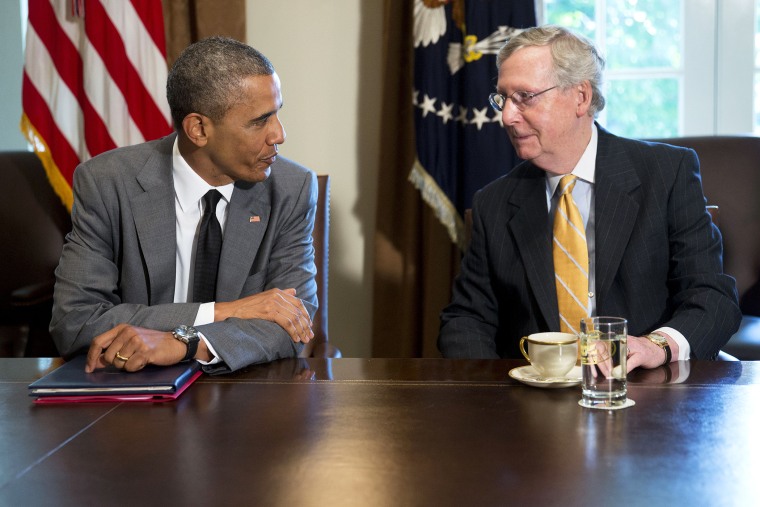A House Judiciary Committee panel will host a hearing on reparations for slavery tomorrow -- the first such congressional discussion in over a decade. The stated purpose of the hearing is to "examine, through open and constructive discourse, the legacy of the Trans-Atlantic Slave Trade, its continuing impact on the community and the path to restorative justice."
The fact that the discussion will unfold on Juneteenth is not an accident.
There is no specific legislative proposal on the table, so it's premature to start thinking about head-counts on how members might vote or how to get a bill past Senate Majority Leader Mitch McConnell (R-Ky.). That said, with the House hearing likely to raise the visibility of the issue tomorrow, a reporter asked the Republicans' Senate leader for his thoughts on the subject this afternoon.
This was his answer in its entirety:
"Yeah, I don't think reparations for something that happened 150 years ago, for whom none of us currently living are responsible, is a good idea."We've, you know, tried to deal with our original sin of slavery by fighting a civil war, by passing landmark civil rights legislation, we've elected an African-American president."I think we're always a work in progress in this country, but no one currently alive was responsible for that and I don't think we should be trying to figure out how to compensate for it. First of all, it'd be pretty hard to figure out who to compensate. We've had waves of immigrants as well who've come to the country and experienced dramatic discrimination of one kind or another."So, no, I don't think reparations are a good idea."
This is obviously a challenging issue, and I won't pretend to be an expert. The complexities deserve a serious debate among policymakers, and I have a hunch McConnell's assessment will be addressed by witnesses in the House subcommittee hearing tomorrow who are more knowledgeable than I and who can speak with more authority than I can.
That said, some elements of the Senate leader's position struck me as obviously problematic.
I don't think the case for reparations, for example, is predicated on the idea that Americans living today "are responsible" for slavery. Rather, the point is that Americans living today are still affected by the system that existed.
Slavery created a foundation upon which generations of wealth and power have been built. McConnell made it seem as if slavery were a relic of a bygone era, but what his argument overlooks is the degree to which those crimes against humanity established structures, the effects of which are felt today.
The Kentucky Republican also expressed concerns about the practical implications of reparations, and the degree to which the process would be complicated. It's not an unreasonable point, but Americans elect federal policymakers to work though complex issues all the time. Lawmakers generally don't have the luxury of throwing up their arms, saying, "That sounds tricky," and then giving up on a policy idea before the debate even begins in earnest.
As for McConnell's reference to Barack Obama, electing an African-American president -- whom McConnell did everything within in his power to thwart and undermine for eight years -- is not, in and of itself, an example of "dealing with" centuries of slavery, followed by decades of segregation and discrimination.
Maybe someone can invite the Senate leader to tomorrow's hearing? I wonder what he might learn from the testimony.
